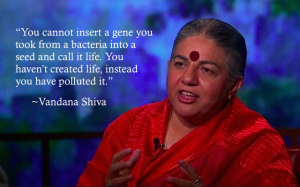Genetic Engineering / Genetic Modification (GMOs) – Scroll down for news and alerts
Take a couple of minutes to see the issues with GMOs clearly defined, on this trailer to the movie
Genetic Roulette 
See also:
GMO Myths and Truths – an evidence-based examination of GMO claims.
GM foods neither safe nor needed, say genetic engineers.
New Zealand News
Why the Rush for Genetically Engineeres Trees – Dr David Suzuki
(One minute video)
We are under attack on all sides – but the main NZ antagonists come from Federated Farmers and Scion.
Tax payer funded Crown Research Institute Scion has been working with Arborgen in developing both GE eucalyptus and pine trees. We are concerned that should these trees be approved by Brazil, Arborgen, and by implication New Zealand, could soon be developing GE tree plantations in Brazil and eventually here.
A major problem is that some overseas “environmentalists” are supporting GE trees for biofuel – as a response to climate change. This is causing a split in the international environmental movement.
Stick with mother nature and you can’t go wrong!
Federated Farmers has lost a court battle with the Northland
Regional Council over regulation of genetically modified organisms.
Federated Farmers had lodged an appeal with the Environment Court over whether the regional council had jurisdiction under the Resource Management Act (RMA) to ban the outdoor use of GMO matter.
The challenge opposed the precautionary GMO provisions in the Northland Regional Policy Statement, a guiding policy document for resource management in Northland for the next decade.
The appeal centred around whether regulation of GMOs in New Zealand was undertaken solely around the Hazardous Substances and New Organisms Act (HSNO), as Federated Farmers contested, or whether some level regulation could be undertaken under the RMA.
The good news is that it is now confirmed that regional councils have the right to make planning decisions about the outdoor use of genetically modified organisms (GMOs) in their regions. Environment Court Judge Newhook determined that there is jurisdiction under the Resource Management Act for regional councils to make provision for GMOs through regional policy statements and plans.
Federated Farmers has now lodged an appeal in the high court contesting this.
Federated Farmers represents about 20% of farmers. Most farmers are happy with conventional farming or organic and bio-dynamic farming, and these farmers will lose choice to farm the way they chose if genetically engineered organisms are allowed into the environment. This is because pollen and other environmental conditions (like floods) allow crops to spread outside a farm gate. 
A history of GMOs in New Zealand:
In 2001, a Royal Commission on Genetic Modification was established to investigate and report on issues surrounding genetic modification in New Zealand. It recommended that New Zealand should proceed with caution while at the same time ensuring that any opportunities from genetic modification are preserved.
• EPA considers the benefits and risks of introducing new organisms (including GM organisms). This is done under the Hazardous Substances and New Organisms Act 1996 (the HSNO Act).
• No GM seeds have been approved for release into the New Zealand environment.
The law does not permit unapproved GM grains or seeds to be knowingly imported or planted. If GM seeds are detected prior to import, the consignment will not be allowed into New Zealand.
• There are strict penalties under the HSNO Act for introducing new organisms (including GM organisms) into New Zealand without approval.
There is an increasing need to look at other dangerous technologies that may be introduced as a way that businesses might get around GE regulation. Techniques of chemical and DNA regulatory elements by synthetic saturation mutagenesis are of current concern. However as with GE technologies, the lack of testing before releasing them on the population and the environment means that considerable regulation is required.
Communities have a right to say “No to GMO!”
See GE free NZ’s very informative web site here
Former genetic engineer now speaks out against GMO risks here
This page is continually work in progress.
Back to the Home page

